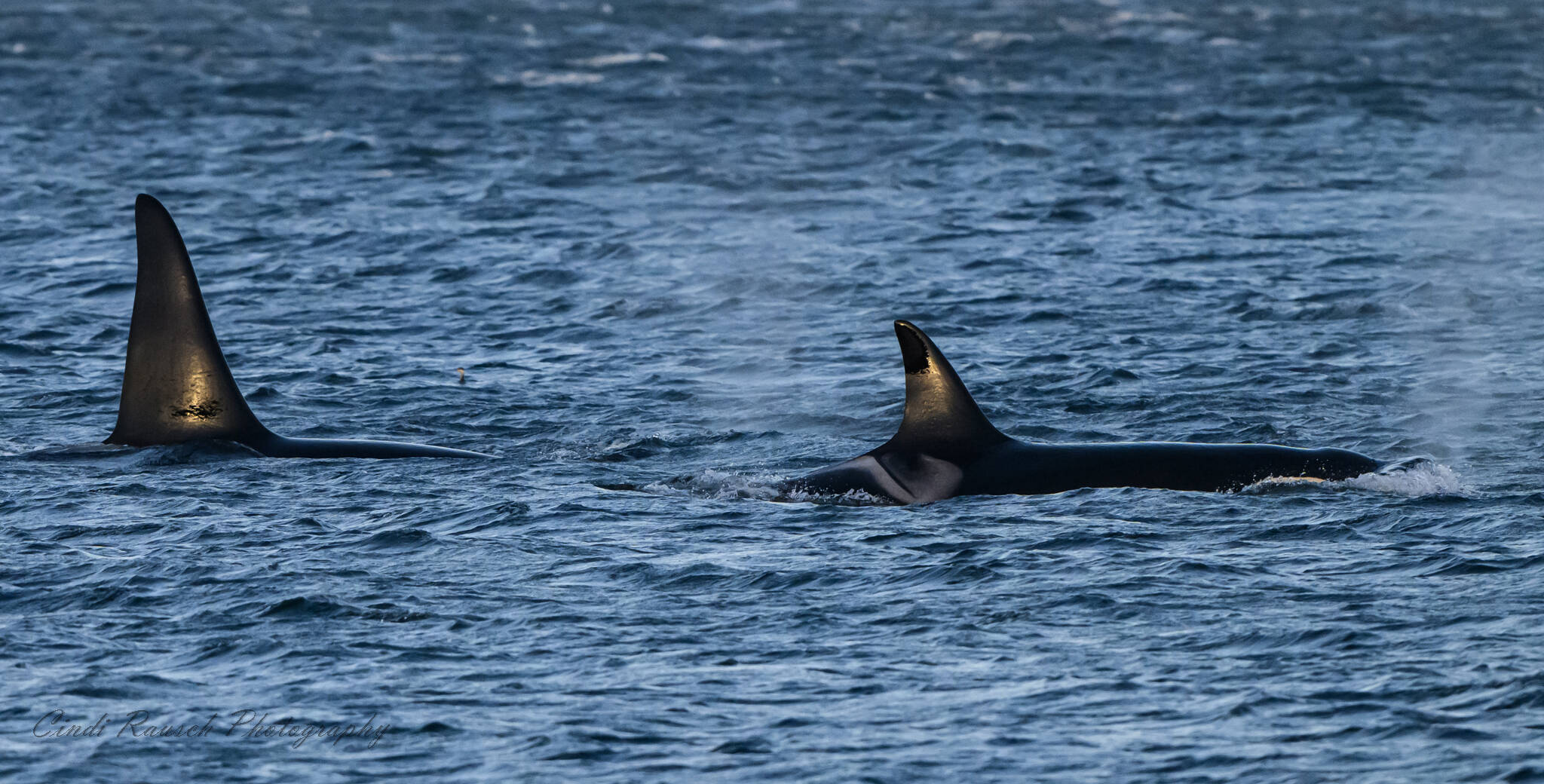After more than 50 years of avoiding Penn Cove, the southern resident orcas finally returned to the site of the tragic whale roundup.
Sunday and Monday, crowds of emotional whale chasers and lucky passersby witnessed members of L-Pod swimming at full speed, jumping and slapping their tails in the waters off Central Whidbey. While the mammal-eating transient orcas have been seen splashing in the area before, the southern residents’ visit evoked widespread excitement.
Cindi Rausch, who has been following orcas around the island for the past three years, took some photos of the historic moment, comparing the whales’ strength and agility to a dancer’s.
“It is a mystery why they chose to return now, but I certainly was grateful and humbled to witness it,” she wrote in a message.
Howard Garrett, co-founder of Orca Network, said the orcas spent a few hours in the cove as they moved around the Saratoga Passage, visiting the area between the Coupeville Wharf and Monroe Landing on Nov. 3 and even moving all the way to the cove’s west end on Nov. 4, reaching the area where Garrett said the most brutal captures happened.
As he observed the pod with delight, he noticed the orcas were not there to forage, but to explore. Southern residents typically hunt in smaller, spread-out groups and take long, deep dives.
Instead of looking for salmon, they poked their heads out of the water in an apparent effort to assess their surroundings, Garrett said.
Many humans remember Penn Cove as the site of a tragedy. In 1970 and 1971, tens of orcas were herded into the cove with the help of explosives, speedboats and airplanes. Ted Griffin and his team captured the whales to sell them to a variety of marine parks around the world, according to Orca Network.
On Aug. 8, 1970, five young orcas, including the famous Tokitae, were seized while three drowned during the capture. A year later, two orcas were taken in another large-scale capture, and the southern residents were never seen in Penn Cove again.
Garrett and fellow Orca Network founder Susan Berta believe there is a possibility that L25, the matriarch of the L-Pod and the only orca who was alive at the time of the captures, has shared the memory of the events with the rest of her family to keep them away from the cove and prevent history from repeating itself.
Though they don’t have direct evidence to confirm this theory, Garrett said there is also no evidence to refute it.
Berta said orcas may have similar oral traditions to the Indigenous people who have shared the Salish Sea with these creatures since time immemorial.
At the same time, Berta said, orcas might be spiritually connected to humans and one another. Somehow, they seemed to know when Tokitae died after 50 years of captivity in the Miami Seaquarium, just before her planned release.
This time they might have felt the healing effects of 26 years of ceremonies held on the anniversary of Tokitae’s capture, and L25 was finally ready to break the taboo of venturing into Penn Cove, Berta said.
“It feels like they were there to do their own healing ceremony,” she said.
Monika Wieland Shields, co-founder and director of the Orca Behavior Institute, was on the water conducting research with the Center for Whale Research when she saw L-Pod head into Penn Cove. She recalled the whales moving in two “tight” groups and displaying some social behavior.
While the event was exciting, she suspects the pod was there just exploring in between bouts of hunting chum salmon returning to Puget Sound. Southern residents tend to follow more regular travel patterns than their mammal-eating relatives, but may sometimes explore new places.
“I think we humans have placed more significance on this event given how we feel about what happened in Penn Cove than the whales probably do,” she wrote in an email.
L25 is believed to be born around 1928, making her approximately 42 years old during the first mass capture, according to Garrett.
Back then, humans had no knowledge of the different southern resident families. But in the 1990s, while observing the five rolls of black-and-white film taken during one of the captures by former Whidbey News-Group Publisher Wallie Funk, a number of L-Pod orcas were recognized by their markings and fin shape size.
Among them was L25, also known as “Ocean Sun.” At approximately 96 years of age, for whatever reason, she decided to lead her kin to Penn Cove.
Though the Miami Seaquarium never released any genetic material, Garrett said, Tokitae could have been related to Ocean Sun.
While Tokitae is gone, Berta said her spirit remains strong in people’s hearts and believes the southern residents know humans have tried to bring her back. At the same time, Garrett said, they could be aware that human activity is depleting their food source, killing them.
Thursday, the Center for Whale Research announced that a southern resident of the K-Pod, K26 “Lobo,” has been missing since July 2024 and is likely deceased. A calf born in September known as L-128 was last seen emaciated while a female pushed her towards a boat of researchers, perhaps in an attempt to send them a message, Garrett said.
Now the calf is presumed dead, bringing the population to 72. In the mid-1990s, the population counted almost 100 individuals.
It’s unknown if the southern residents will be seen swimming in Penn Cove again. However, amid the sad news, their brief visit gives Berta some hope.
“It’s the one bright light that we can hold onto,” she said.
Note: The original version of this story mistakenly attributed the news of the disappearence of K26 to the Orca Conservancy, a Washington nonprofit. While Orca Conservancy did share the news, announcements about births and deaths are only made by the Center for Whale Research. Additionally, K26 was last seen in July, not December. We regret the error.



